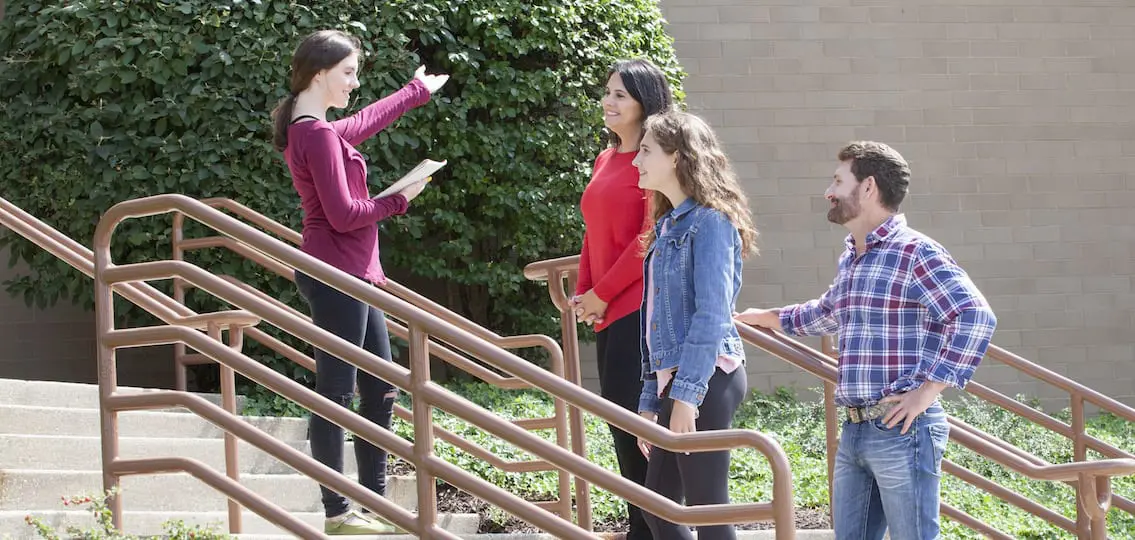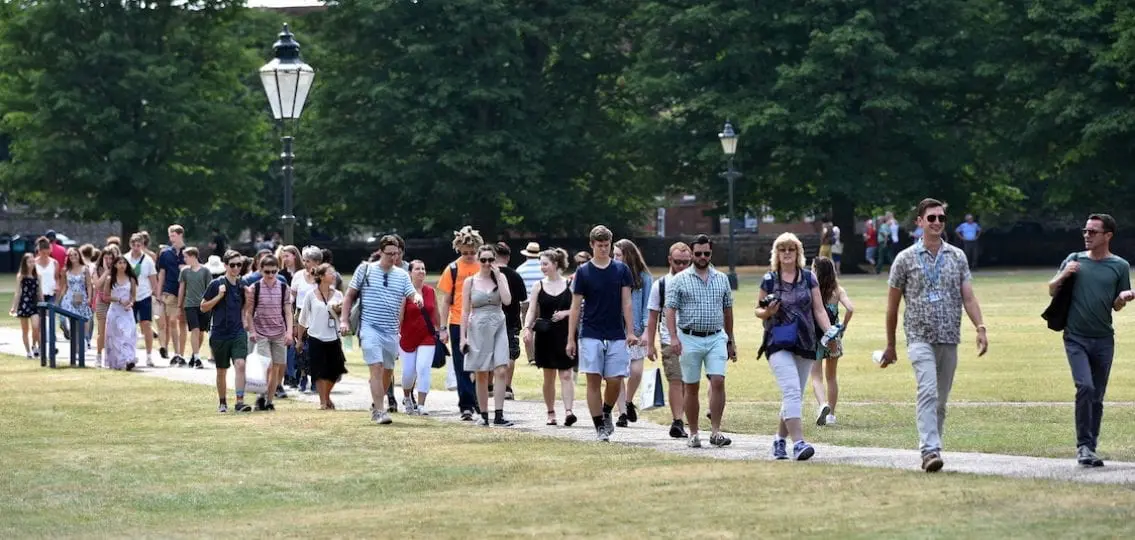Visiting colleges with your teenager is an exciting milestone, but the process can be overwhelming and even stressful. And I should know. Over the past 18 months, my teenager and I have toured more than a dozen college campuses. There are important things to do in order to make the most of your time on campus.

10 Tips for College Visit
1. Do your homework.
Do research before you visit. With limited time and resources, it’s important to investigate prior to arriving on campus. Every college has a website and while not a substitute for a campus visit, it’s a good starting point for information.
“There is a wealth of information on college websites,” says Sue Davis, Director of Undergraduate Admissions at Youngstown State University. “You can get very specific information, like course descriptions and faculty bios, which can be tremendously helpful.”
2. Start early.
We began making college visits with my daughter in the fall of her junior year. In hindsight, I wish we had started sooner. Between our work schedules and her commitments (academics, sports, activities), we couldn’t visit all of the colleges on her list.
Check websites to confirm the days and times of tours and information sessions; some colleges require students to sign up in advance. Finally, many schools allow students to stay overnight in a dorm, lunch with a current student or have an on-campus interview. These opportunities book up quickly, so call well in advance to schedule.
3. Go beyond the tour.
The tour and information session provide a good overview of a college. But, to really get a feel for a school, you need to take the time to explore the campus. Allow at least half a day per college.
“Try to get a sense of what it’s like to make a home on campus. Check out facilities that are important to you— the library, music, sports, dorms,” recommends Dr. Michele Hernandez, President of Hernandez College Counseling and author of A is for Admission.
So, go ahead and eat in the dining room, hang out in the student center or work out at the gym. And try to talk to the students you meet along the way. At one school, we got lost trying to find one of the academic buildings, and my daughter asked a student for directions. He wound up walking us there and telling her why he chose the school and what his experience had been like so far.
4. Ask questions.
Make a list of questions before you leave on your trip. In fact, Kelly Queijo, founder of SmartCollegeVisit.com, suggests asking the same questions on every tour. This helps your teenager make an “apples to apples” comparison of each school, a helpful tool for assessing prospective schools on your return home.
And, don’t be afraid to ask tough questions. “Choosing a school is a lot like buying a house. The decision is both emotional and intellectual. On a college visit, try to relax, take it all in and be honest with yourself about whether it is the right fit for you,” advises Eric Furda, Dean of Admissions at the University of Pennsylvania.
5. Take notes.
Especially when you are visiting multiple schools in a few days, the tours can blend into one another. Find a way so that your teenager can document her thoughts in real time; also, your teen should note the name of the tour guide and any other students or officials she meets on the visit so that she can contact them with follow-up questions.
6. Go to class.
My daughter sat in on classes at several schools and found it very helpful. It gave her a chance to observe the professors and see how the students interacted with the faculty.
Most professors are happy to meet with a prospective student. So, if your teenager is passionate about a particular subject—be it French literature or biomedical engineering—get the names of one or two professors in those departments. Your teenager can either email those faculty members directly to set up a meeting or ask the admissions department. The bottom line: speaking with a professor can give your teenager clues beyond the course catalog about what it’s like to attend the college.
“I would also suggest going on a tour on a weekday instead of on a weekend,” says YSU’s Davis. “When you’re here during the weekday, you can see what classes are really like. During the weekends, a lot of students are in their residence halls, so you can’t get a sense of that.”
7. Schedule an interview.
These days, many colleges do not require prospective students to have an interview, but that doesn’t mean your teenager shouldn’t sign up for one when offered. An impressive interview can work in your teenager’s favor. These slots are handed out on a first-come, first-served basis—another reason to plan your trip in advance.
8. Look beyond academics.
Skim through the bulletin boards in the student center and other buildings. These indicate what kind of clubs, speakers and events are happening on campus and whether there are activities that appeal to your student. Also, find out what is going on outside of campus. At many colleges, the surrounding areas and cities are a big part of the social life at the college. “Also ask your tour guide. They are typically students who are involved in a lot of activities on campus,” Davis adds.
9. Parents, step back.
Throughout the entire college application process, but particularly when visiting campuses, parents should let their teenager take the lead. “Remember this is your student’s journey, not yours,” says Robin Mamlet, the former Dean of Admissions at Swarthmore College and coauthor of College Admission: From Application to Acceptance, Step by Step. “It is up to parents to help their child make the best choice for himself.”
That means letting your teenager ask (a lot of, if not all) the questions. “Take the back seat,” advises Terri McCue, Director of College Counseling at Hathaway Brown School in Cleveland, Ohio. “You should be at the back of the line, while your child is at the front of the line.”
10. Have fun!
Last, but hardly least of must-do college visit tips, take some time during your trip to have fun with your teen. See a ball game, go sightseeing or eat at a popular local restaurant. Not only will you get a feel for the area around campus, you’ll be spending some soon-to-be-precious moments with your teenager. So, embrace the opportunity. Before you know it, you’ll be leaving your teenager on campus and heading home alone.





